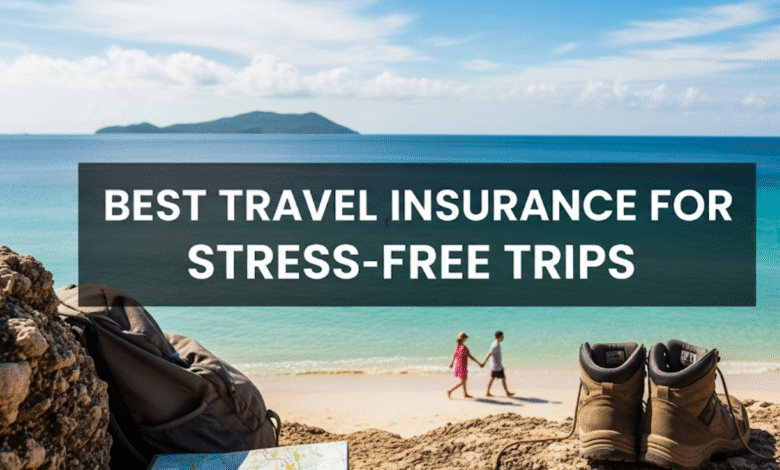
Best Travel Insurance, Picture this: You’re finally on that dream vacation you’ve been planning for months. The sun is shining, the beach is perfect, and then – disaster strikes. Your luggage goes missing, you get food poisoning, or a family emergency forces you to cut your trip short. Without travel insurance, what should be minor bumps in the road can turn into financial nightmares that ruin your entire experience.
Travel insurance isn’t just another expense to add to your vacation budget – it’s your safety net that transforms potential disasters into manageable inconveniences. Whether you’re backpacking through Europe, taking a family cruise, or heading on a business trip, the right travel insurance policy can save you thousands of dollars and countless hours of stress.
In this comprehensive guide, we’ll walk you through everything you need to know about choosing the best travel insurance for your needs. From coverage types to cost comparisons, we’ve got you covered so you can focus on what really matters: enjoying your trip.
Why Travel Insurance Matters More Than Ever
The travel landscape has changed dramatically in recent years. Flight cancellations are more common, medical costs abroad continue to rise, and unexpected events can derail even the most carefully planned trips. Here’s why travel insurance has become essential rather than optional:
Medical emergencies abroad can bankrupt you. A simple broken bone in the United States can cost $2,500, but the same injury in Switzerland could run you $15,000 or more. If you need emergency evacuation from a remote location, you’re looking at costs that can easily exceed $100,000.
Trip cancellations are expensive. The average vacation costs American families around $4,500. If you have to cancel due to illness, natural disasters, or other covered reasons, travel insurance can reimburse your non-refundable expenses.
Your regular health insurance probably won’t help. Most domestic health insurance plans provide little to no coverage when you’re traveling internationally. Even if they do cover emergencies, you’ll likely pay out-of-pocket first and wait for reimbursement later.
Types of Travel Insurance Coverage
Travel insurance isn’t one-size-fits-all. Different policies offer various types of coverage, and the best choice depends on your specific travel plans and risk tolerance.
Trip Cancellation and Interruption Protection
This is often the most valuable part of any travel insurance policy. Trip cancellation coverage reimburses you for non-refundable trip costs if you need to cancel before departure for a covered reason. Trip interruption coverage does the same if you need to cut your trip short.
Covered reasons typically include:
- Illness or injury to you, a travel companion, or immediate family member
- Death in the family
- Natural disasters affecting your destination
- Terrorist attacks
- Job loss (under certain conditions)
- Jury duty or military deployment
Pro tip: Look for policies that offer “Cancel for Any Reason” (CFAR) coverage if you want maximum flexibility. This upgrade typically costs 40-60% more but allows you to cancel for literally any reason and receive 50-75% of your non-refundable trip costs back.
Medical and Emergency Evacuation Coverage
Medical coverage pays for emergency medical treatment while you’re traveling. Emergency evacuation coverage handles the cost of getting you to appropriate medical care, which can be crucial if you’re in a remote area or a country with limited medical facilities.
Key points to consider:
- Look for policies with at least $100,000 in medical coverage
- Emergency evacuation coverage should be at least $500,000
- Some policies exclude certain activities like extreme sports
- Pre-existing medical conditions may or may not be covered
Baggage and Personal Effects Protection
Lost, stolen, or damaged luggage can put a serious damper on your trip. Baggage coverage reimburses you for lost items and can provide funds to buy essential items if your luggage is delayed.
What’s typically covered:
- Lost, stolen, or damaged personal belongings
- Baggage delay expenses (toiletries, clothing, etc.)
- Important document replacement
- Laptop and electronics (often with sub-limits)
Travel Delay Coverage
Flight delays and cancellations can cost you money for meals, accommodations, and other unexpected expenses. Travel delay coverage kicks in when your trip is delayed by a certain amount of time (usually 6-12 hours) due to covered reasons.
Also Check – Family Health Insurance Plans You Can Trust
Top Travel Insurance Providers Comparison
| Provider | Best For | Starting Price | Medical Coverage | Evacuation Coverage | Cancel for Any Reason |
|---|---|---|---|---|---|
| World Nomads | Adventure travelers | $4/day | $100,000 | $300,000 | No |
| Allianz Travel | Families | $28 | $50,000 | $1,000,000 | Yes (upgrade) |
| Travel Guard | Comprehensive coverage | $35 | $250,000 | $1,000,000 | Yes (upgrade) |
| IMG Global | International trips | $25 | $2,000,000 | $1,000,000 | No |
| Generali Global | Luxury travelers | $45 | $100,000 | $1,000,000 | Yes (upgrade) |
Prices shown are approximate and vary based on trip cost, duration, age, and destination.
World Nomads: Adventure Seeker’s Choice
World Nomads specializes in coverage for adventurous travelers who might engage in activities that other insurers exclude. Their policies cover a wide range of adventure sports and activities, making them popular with backpackers and thrill-seekers.
Strengths:
- Covers many adventure activities
- Can purchase and claim online
- Available to travelers already abroad
- 24/7 emergency assistance
Weaknesses:
- No Cancel for Any Reason option
- Limited coverage for expensive items
- Higher deductibles on some coverage
Allianz Travel: Family-Friendly Protection
Allianz is one of the largest travel insurance companies globally and offers comprehensive coverage that works well for families and traditional vacation travelers.
Strengths:
- Strong financial ratings
- Cancel for Any Reason available
- Good customer service reputation
- Multiple plan options
Weaknesses:
- Can be expensive for comprehensive coverage
- Some exclusions for pre-existing conditions
- Complex policy language
Travel Guard: Maximum Coverage Options
Travel Guard offers some of the most comprehensive coverage available, with high limits and extensive protection options.
Strengths:
- Very high coverage limits
- Excellent emergency assistance
- Multiple plan tiers
- Good for expensive trips
Weaknesses:
- Higher premiums
- Complex claim process
- Many exclusions in basic plans
How Much Does Travel Insurance Cost?
Travel insurance typically costs between 4% and 8% of your total trip cost, but several factors influence the final price:
- Trip cost: The more expensive your trip, the higher your premium will be.
- Your age: Older travelers pay significantly more due to increased health risks.
- Destination: Trips to countries with higher medical costs or political instability cost more to insure.
- Trip length: Longer trips mean more exposure to potential problems.
- Coverage level: Basic plans cost less but offer limited protection.
Sample Pricing Scenarios
Young couple (ages 28 and 30), $3,000 European vacation, 10 days:
- Basic coverage: $120-180
- Comprehensive coverage: $240-360
- With Cancel for Any Reason: $360-540
Family of four (parents age 45, kids 12 and 15), $8,000 Disney cruise, 7 days:
- Basic coverage: $280-400
- Comprehensive coverage: $560-800
- With Cancel for Any Reason: $800-1,200
Senior couple (ages 68 and 65), $5,000 river cruise, 14 days:
- Basic coverage: $500-750
- Comprehensive coverage: $750-1,250
- With Cancel for Any Reason: $1,000-1,875
Money-Saving Tips for Travel Insurance
Travel insurance doesn’t have to break the bank. Here are proven strategies to get the coverage you need while keeping costs reasonable:
Buy Early for Better Rates and Coverage
Purchase your travel insurance within 14-21 days of making your first trip payment (usually your initial deposit). This timing often qualifies you for:
- Pre-existing medical condition waivers
- Cancel for Any Reason coverage
- Better rates on some policies
Consider Annual Policies for Frequent Travelers
If you take multiple trips per year, an annual multi-trip policy might be more economical than buying individual policies for each trip. These policies typically cover:
- Unlimited trips up to 30-45 days each
- Lower cost per trip
- Consistent coverage across all trips
Skip Unnecessary Coverage
Don’t pay for coverage you don’t need:
- If your health insurance covers international travel, you might skip medical coverage
- Credit cards sometimes provide trip cancellation protection
- Your homeowner’s insurance might cover belongings while traveling
Use Comparison Sites Wisely
Online comparison sites can be helpful, but remember that they don’t always show every available option. Some of the best policies are only available directly from insurers or through travel agents.
Red Flags: What to Avoid When Shopping
Not all travel insurance policies are created equal. Watch out for these warning signs:
- Extremely low prices: If a policy seems too cheap, it probably doesn’t offer adequate coverage. Read the fine print carefully.
- Limited medical coverage: Policies with less than $50,000 in medical coverage are rarely adequate for international travel.
- Excessive exclusions: Some policies exclude so many activities and situations that they’re almost worthless.
- Poor customer service reviews: A company that’s hard to reach when you’re buying a policy will be even harder to deal with when you need to make a claim.
- No AM Best rating: Stick with insurers that have good financial strength ratings from AM Best or similar rating agencies.

Making a Claim: What You Need to Know
Even the best travel insurance policy is worthless if you can’t successfully make a claim when you need to. Here’s how to protect yourself:
Document Everything
Keep detailed records of all expenses related to your claim:
- Original receipts for all expenses
- Medical records and doctor’s reports
- Police reports for theft or crime
- Airline documentation for delays or cancellations
- Photos of damaged belongings
Report Claims Quickly
Most insurers require you to report claims within a specific timeframe, often 20-30 days. Don’t wait – report your claim as soon as possible.
Follow Up Regularly
Stay in touch with your insurance company throughout the claims process. Keep records of all communications and don’t be afraid to escalate if you’re not getting proper attention.
Special Considerations for Different Types of Travelers
Business Travelers
Business travelers have unique needs that leisure travel insurance might not address:
- Coverage for business equipment and documents
- Trip interruption for work-related reasons
- Higher limits for personal belongings
- Coverage for rental car damage
Adventure Travelers
If your trip involves adventure activities, make sure your policy covers them:
- Read activity exclusions carefully
- Consider specialty adventure travel insurance
- Verify coverage for equipment rental and rescue operations
- Check altitude and location restrictions
Senior Travelers
Older travelers face unique challenges and should look for:
- High medical coverage limits
- Pre-existing condition coverage
- Emergency evacuation coverage
- 24/7 assistance services
Group Travel
Traveling with a large group requires special considerations:
- Group policies can offer discounts
- Consider what happens if one person cancels
- Verify coverage for group activities
- Check if group leaders have additional responsibilities
International Travel: Extra Protection You Need
International travel exposes you to risks that don’t exist on domestic trips:
- Political instability and terrorism: Look for policies that cover trip cancellation due to State Department travel advisories.
- Currency fluctuations: Some policies reimburse additional costs due to unfavorable exchange rate changes.
- Embassy assistance: Verify that your policy includes help with embassy services and document replacement.
- Repatriation coverage: This pays to return your remains home if you die while traveling – a morbid but important consideration.
Digital Nomads and Long-Term Travel
Traditional travel insurance isn’t designed for people who travel for months or live abroad temporarily. If you’re a digital nomad or long-term traveler, consider:
- International health insurance: These policies are designed for extended stays abroad and often include preventive care.
- Worldwide coverage: Make sure your policy doesn’t exclude your home country if you might return temporarily.
- Equipment coverage: Digital nomads need extensive coverage for laptops, cameras, and other expensive equipment.
- Flexible terms: Look for policies you can extend or modify while traveling.
The Future of Travel Insurance
The travel insurance industry is evolving rapidly:
- Technology integration: Apps now let you buy policies, file claims, and get assistance all from your phone.
- Pandemic coverage: Post-COVID policies increasingly include coverage for epidemic and pandemic-related cancellations.
- Parametric insurance: Some new policies automatically pay out based on specific triggers (like flight delays) without requiring traditional claims.
- Climate change adaptation: Insurers are adjusting coverage and pricing to account for increasingly frequent weather-related disruptions.
Also Read – Critical Illness Insurance: Is It Really Worth Buying?
Frequently Asked Questions
Q: When should I buy travel insurance? A: Buy travel insurance as soon as you make your first trip payment, ideally within 14-21 days. This timing often qualifies you for the best coverage options and rates.
Q: Does travel insurance cover COVID-19? A: Many modern policies include COVID-19 coverage for medical treatment and trip cancellation, but coverage varies by insurer. Always check the specific terms of any policy you’re considering.
Q: Can I buy travel insurance after I’ve already left home? A: Some insurers allow you to purchase coverage after departure, but you’ll typically get limited benefits and won’t be eligible for trip cancellation coverage.
Q: Will travel insurance cover me if I participate in extreme sports? A: Standard travel insurance often excludes dangerous activities. If you plan to participate in adventure sports, look for specialized policies or add-on coverage that specifically includes your activities.
Q: How do I know if my credit card’s travel insurance is enough? A: Credit card travel benefits are often limited and may only cover specific situations. Compare your card’s benefits to standalone travel insurance to identify any gaps in coverage.
Q: What’s the difference between travel insurance and travel health insurance? A: Travel insurance is comprehensive coverage that includes trip cancellation, baggage protection, and medical coverage. Travel health insurance focuses specifically on medical expenses and emergency evacuation while traveling.
Q: Do I need travel insurance for domestic trips? A: Travel insurance can be valuable for domestic trips, especially if you’re taking an expensive vacation, traveling during severe weather seasons, or have non-refundable bookings.
Q: Can I get a refund on my travel insurance if I don’t use it? A: Most travel insurance policies have a “free look” period (typically 10-15 days) during which you can cancel for a full refund. After that, refunds are generally not available unless you haven’t departed on your trip.
Your Next Steps to Stress-Free Travel
Choosing the right travel insurance doesn’t have to be overwhelming. Start by honestly assessing your needs, risk tolerance, and budget. Consider the value of what you’re protecting – not just the money you’ve spent, but also the peace of mind that comes with knowing you’re covered.
Remember that the cheapest policy isn’t always the best value, and the most expensive policy isn’t necessarily the most comprehensive for your specific needs. Take time to read policy documents, compare coverage limits, and understand what’s excluded.
Most importantly, don’t wait until disaster strikes to think about travel insurance. By the time you’re dealing with a medical emergency in a foreign country or facing thousands of dollars in cancellation fees, it’s too late to buy protection.
The best travel insurance policy is the one you hope you’ll never need to use but are grateful to have when unexpected situations arise. With the right coverage in place, you can focus on creating amazing memories instead of worrying about what might go wrong.
Start your search early, compare your options carefully, and choose a policy that matches your travel style and budget. Your future self will thank you for taking this important step toward truly stress-free travel.
Check This – Life Insurance Secrets Agents Don’t Tell You

